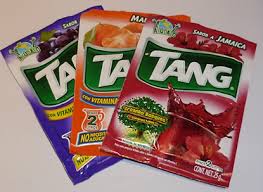tang
英 [tæŋ]
美 [tæŋ]
- n. 特性;强烈的味道;柄脚
- vt. 使声尖锐;装刀柄于
- vi. 发出铿锵声;发出当的一声
- n. (Tang)人名;(柬、缅)当
星级词汇:

中文词源
tang 刺鼻气味
来 自 古 英 语 tang, 蛇 信 子 , 蛇 的 舌 头 , 来 自 古 诺 斯 语 tangi, 尖 的 金 属 棒 , 尖 叉 , 来 自 Proto-Germanic*tang,咬,来自 PIE*denk,咬,词源同 tongs,tough.因蛇信子散发强烈的刺鼻恶 臭而引申该词义。
英语词源
- tang (n.)
- mid-14c., "serpent's tongue" (thought to be a stinging organ), later "sharp extension of a metal blade" (1680s), from a Scandinavian source akin to Old Norse tangi "spit of land; pointed end by which a blade is driven into a handle," from Proto-Germanic *tang-, from PIE *denk- "to bite" (see tongs). Influenced in some senses by tongue (n.). Figurative sense of "a sharp taste" is first recorded mid-15c.; that of "suggestion, trace" is from 1590s. The fish (1734) so called for their spines.
权威例句
- 1. "Tang" is "Gnat" spelt backwards.
- Gnat倒着写出来就是Tang。
- 2. She could smell the salty tang of the sea.
- 她能闻到海水浓烈的咸味。
- 3. the tang of lemons
- 清爽的柠檬味
- 4. Li Bai was a Tang poet of superb talent.
- 李白是唐代一位才气横溢的诗人.
- 5. The Tang Dynasty was the golden age of classical Chinese poetry.
- 唐朝是中国古诗的极盛时期.
